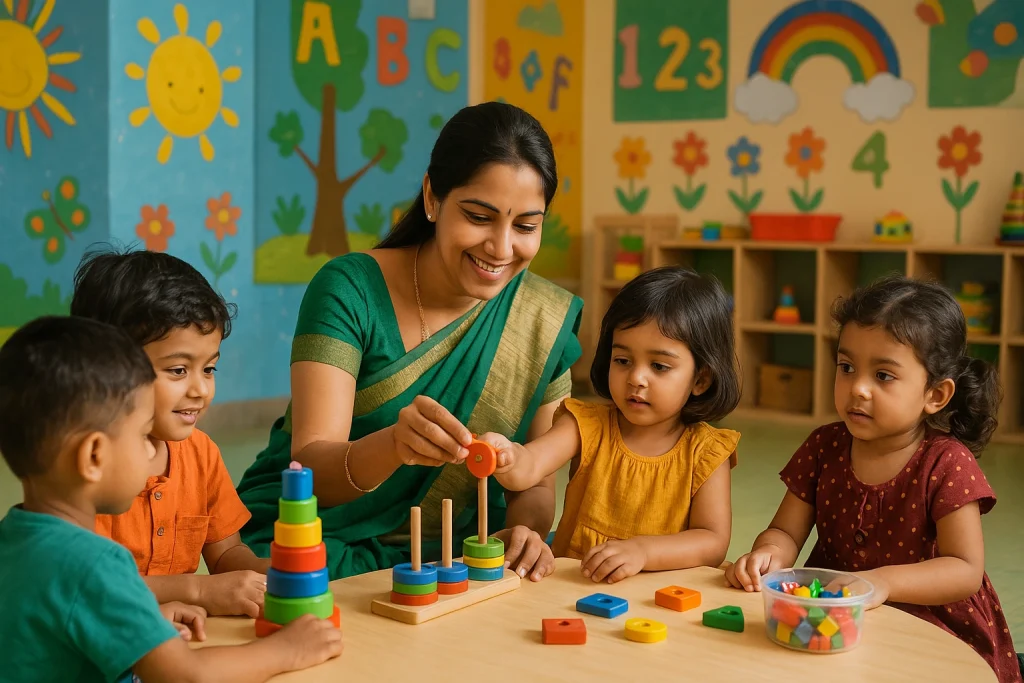
Early Childhood Care & Education (ECCE) Training
Early childhood is perhaps the most important phase of a human being’s life. During this period from birth to six years of age, children grow at a very fast pace physically, emotionally, cognitively, and socially. The environment, nurturing, and education during this phase have a lasting influence on their overall personality and future learning capacities. This is where training in Early Childhood Care and Education (ECCE) is needed. ECCE is not just teaching alphabets or numbers—it is a whole approach that deals with encouraging the curiosity, creativity, emotional intelligence, and social skills of a child. ECCE training, which can be done professionally, equips teachers, caregivers, and would-be educators with the skills and knowledge to lead children in their most critical years.
What is ECCE Training?
ECCE training is an advanced course that trains professionals to work with children aged 0–6 years. It educates teachers on contemporary teaching methodologies, psychology, and child development principles to form a strong foundation for learning.
Training focuses on:
Learning about child psychology and phases of development.
Creating activities for cognitive and physical development specific to each age group.
Fostering emotional stability and good social habits.
Applying play-based learning techniques as a main teaching methodology.
Encouraging awareness about health, safety, and nutrition among children.
This combination of theory and practice helps ensure that teachers are able to manage the requirements of varying children in a sensitive and professional manner.
Role of ECCE in the Modern Era
Education in the modern world is not merely about books—it’s about developing confidence, independence, and compassion. The early childhood years lay the groundwork for life-long learning. Studies indicate that students who participate in quality early childhood education excel academically and socially in their later lives.
Some of the main reasons why ECCE matters:
Brain Development – Nearly 90% of brain development occurs prior to six years of age. Exposing children to stimulating activities at this age develops memory, creativity, and problem-solving skills.
Emotional Intelligence – Through ECCE, kids learn to control their emotions, share, and work with others, developing resilience and sympathy.
School Readiness – ECCE-trained teachers ensure that children can transition into formal school easily with skills such as communication, discipline, and curiosity.
Social Contribution – Educated children become responsible citizens who give back to society.
Who Should Take ECCE Training?
ECCE training can be taken by:
Aspiring nursery or pre-primary teachers.
Current teachers who would like to enhance their expertise.
Child caretakers, nannies, and caregivers.
Those planning to set up preschools, day-care centers, or play schools.
Parents wishing to know more about child psychology and development.
Skills Acquired Through ECCE Training
Creative Teaching Skills – Designing innovative learning activities, storytelling, music, and role-play.
Classroom Management – Dealing with children with patience, empathy, and clear communication.
Child Assessment – Observing and documenting developmental milestones.
Holistic Development Knowledge – Integrating physical, emotional, cognitive, and social learning.
Professional Growth – Building confidence and employability in the teaching profession.
Career Opportunities After ECCE Training
One of the greatest strengths of ECCE training is its large career scope. Trained practitioners are sought after all over the world as the role of early childhood education becomes increasingly more prominent. Some of the career options are:
Pre-school / Nursery Teacher
Day-care Center Facilitator
Child Development Trainer
Curriculum Designer for Early Education
Special Needs Educator (with extra training)
Entrepreneur (operating preschools or child-care centers)
With globalization, trained ECCE teachers also seek opportunities abroad, particularly in international schools and child-care centers.
Advantages of Joining an ECCE Course
Professional Recognition – Fully certified ECCE professionals are embraced by schools, parents, and institutions.
Job Security – Early childhood educator jobs are always in demand.
Personal Growth – Working with children instills patience, creativity, and empathy.
Flexibility – One can find opportunities in schools, NGOs, private centers, and even at home offices.
Contribution to Society – Through molding young lives, teachers directly contribute towards creating a more robust future generation.
Why Select Professional ECCE Training Institutes?
All training programs are not the same. Selecting an institution that is government-approved and skill-based ensures enhanced knowledge and authenticity. A professional training program offers:
Up-to-date curriculum based on child development theories.
Practical training through workshops and internships.
National and international certifications.
Mentorship by experienced teachers and child psychologists.
Such institutes not only enhance teaching skills but also open doors to career growth across different education sectors.
Conclusion:-
Early Childhood Care and Education (ECCE) is needed ECCE training is not a class in the classical sense,it is a calling to mold the future. Investing in the training gives potential educators and caregivers the power to shape young minds during those pivotal early years. The education and skills gained ensure the young children develop into capable learners, compassionate citizens, and trustworthy members of society.
Categories: Uncategorized